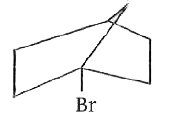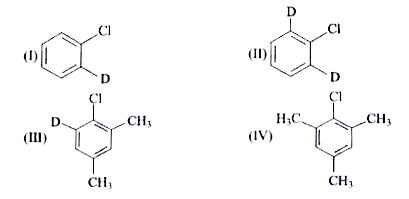Which of the following does not give nucleophilic substitution with alcohol :
CH3COCl
Acetic anhydride
Ether
None
The correct Answer is:C
To solve the question "Which of the following does not give nucleophilic substitution with alcohol?", we need to analyze the behavior of different compounds when reacted with alcohols.
1. Understanding Nucleophilic Substitution:
- Nucleophilic substitution occurs when a nucleophile (in this case, alcohol, R-OH) attacks an electrophile (a positively charged or partially positively charged carbon) and replaces a leaving group.
2. Identifying the Compounds:
- We need to evaluate the options provided (let's assume they are A, B, C, and D, with C being ether based on the transcript).
3. Analyzing Option A:
- Assume Option A is a carbonyl compound (like an acyl chloride). The carbon in the carbonyl is electrophilic due to the presence of electronegative atoms (like Cl or O).
- The alcohol can attack this carbon, leading to a nucleophilic substitution reaction. Therefore, Option A does undergo nucleophilic substitution.
4. Analyzing Option B:
- Assume Option B is acetic anhydride. The carbonyl carbon here is also electrophilic.
- The alcohol can attack this carbon, and the reaction proceeds with the formation of an acetate ion as a leaving group. Thus, Option B also undergoes nucleophilic substitution.
5. Analyzing Option C (Ether):
- Ethers (R-O-R') do not have a sufficiently electrophilic carbon. The oxygen atom in ethers has lone pairs, and there is no positive charge on the carbon atoms.
- When alcohol (R-OH) reacts with ether, there is no electrophilic carbon for the alcohol to attack, and thus no nucleophilic substitution occurs. Therefore, Option C does not undergo nucleophilic substitution.
6. Analyzing Option D:
- Assume Option D is another electrophilic compound (like an alkyl halide). The carbon in alkyl halides is also electrophilic due to the presence of a halogen.
- The alcohol can attack this carbon, leading to nucleophilic substitution. Therefore, Option D does undergo nucleophilic substitution.
7. Conclusion:
- After analyzing all options, we conclude that the compound that does not give nucleophilic substitution with alcohol is Option C (Ether).
Final Answer:
Option C (Ether) does not give nucleophilic substitution with alcohol.
- Nucleophilic substitution occurs when a nucleophile (in this case, alcohol, R-OH) attacks an electrophile (a positively charged or partially positively charged carbon) and replaces a leaving group.
- We need to evaluate the options provided (let's assume they are A, B, C, and D, with C being ether based on the transcript).
- Assume Option A is a carbonyl compound (like an acyl chloride). The carbon in the carbonyl is electrophilic due to the presence of electronegative atoms (like Cl or O).
- The alcohol can attack this carbon, leading to a nucleophilic substitution reaction. Therefore, Option A does undergo nucleophilic substitution.
- Assume Option B is acetic anhydride. The carbonyl carbon here is also electrophilic.
- The alcohol can attack this carbon, and the reaction proceeds with the formation of an acetate ion as a leaving group. Thus, Option B also undergoes nucleophilic substitution.
- Ethers (R-O-R') do not have a sufficiently electrophilic carbon. The oxygen atom in ethers has lone pairs, and there is no positive charge on the carbon atoms.
- When alcohol (R-OH) reacts with ether, there is no electrophilic carbon for the alcohol to attack, and thus no nucleophilic substitution occurs. Therefore, Option C does not undergo nucleophilic substitution.
- Assume Option D is another electrophilic compound (like an alkyl halide). The carbon in alkyl halides is also electrophilic due to the presence of a halogen.
- The alcohol can attack this carbon, leading to nucleophilic substitution. Therefore, Option D does undergo nucleophilic substitution.
- After analyzing all options, we conclude that the compound that does not give nucleophilic substitution with alcohol is Option C (Ether).
Option C (Ether) does not give nucleophilic substitution with alcohol.
Similar Questions
Knowledge Check
Which ofthe following is most reactive towards nucleophilic substitution reaction ?
ACH2=CH−ClBC6H5ClCCH3CH=CHClDClCH2−CH=CH2Which of the following reactant will not favour nucleophilic substitution reaction ?
A BPh-BrCCH3CH3∣C∣CH3−CH2−BrDAll the above
BPh-BrCCH3CH3∣C∣CH3−CH2−BrDAll the aboveWhich of the following will not undergo nucleophilic aromatic substitution ?
 AI, II and IIIBII and IVVCIII and IVDonly IV
AI, II and IIIBII and IVVCIII and IVDonly IV
Which of the following compounds undergoes
nucleophilic substitution most readly?
View SolutionWhich of the following is least reactive towards nucleophilic substitution?
View SolutionWhich of the following statement is not correct for nucleophilic substitution reaction ?
View SolutionWhich of the following does not give a precipitate with alcoholic AgNO3 ?
View SolutionWhich of the following undergoes nucleophilic substitution exclusively by SN1 mechanism?
View Solution
